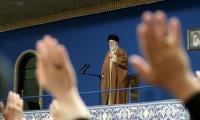ISLAMABAD: The Adviser to the Prime Minister on Foreign Affairs, Sartaj Aziz, on Tuesday said that the Indus Water Treaty (IWT) was an international agreement and India could not revoke or alternate it unilaterally and if that happened it would be considered an act of war.
Speaking in the Senate and National Assembly, Sartaj Aziz noted that the international law stated that India could not unilaterally separate itself from the treaty. After reluctance by the Indian Supreme Court to entertain an application in this regard, there was a possibility that India would not revoke the agreement fully.
He said the Indus Commission and the ministry had been asked to brief on this issue and an inter-ministerial group had been formed to identify possible misuse or interference into the treaty by India.
The National Assembly on Tuesday passed a unanimous resolution condemning the Indian claim in the UN General Assembly (UNGA) that Jammu and Kashmir was an integral part of India and threats being issued by the Indian prime minister to unilaterally terminate the Indus Water Treaty.
Responding to a calling attention notice in the NA, the adviser said there was no provision of suspension in the treaty. “As per sub provision 3 and 4 of provisions of Article 12 of the Treaty, it cannot be altered or revoked unilaterally,” he said.
He maintained that Pakistan would not accept Indian aggression in any form and any Indian step for disrupting water flow as upper riparian would carry considerable risk of war and hostilities. “If India tries to violate the treaty, there will be a befitting reaction from Pakistan,” he said.
Dr. Shireen Mazari and other PTI parliamentarians who moved the calling attention notice wanted to draw attention towards the Indian government’s belligerent attitude on Occupied Kashmir and threat of unilaterally suspending the Indus Water Treaty.
Sartaj Aziz pointed out such an Indian act may also provide China with justification to consider suspension of water of Indian River Brahmaputra. “India has already damaged its credentials by even considering revocation of the treaty and disrupting water flow into Pakistan.”
Sartaj Aziz said that Pakistan was gaining support of international community on the issue, saying that Pakistan was considering to brief the P-5 countries and international community about the dangers of suspending the treaty.
He said the IWT was binding on both countries and there was no provision of unilateral exit. He said the treaty was not suspended even during wars between the two countries.Sartaj Aziz said the provocative statements and actions from the Indian leadership on the IWT are violation of international laws and breach of water treaty.
He said it was highly irresponsible on the part of India to even consider revoking of this treaty as unilateral revocation can pose a threat to Pakistan and its economy.He pointed out that the Indian act would be taken as a breach of international peace and hence giving Pakistan a good reason to approach the UNSC on this issue.
The adviser said Pakistan would not accept any pressure from India and continue to expose the brutal Indian atrocities being perpetrated in Indian-Held Kashmir (IHK) by the Indian forces.He said Pakistan would continue to highlight the worsening human rights situation in the IHK.
He said the Pakistan government is preparing a comprehensive dossier on Kulboshan Yadev and Indian interference in Balochistan as well as its operations through Afghanistan, adding that Pakistan would expose India at the UNSC and before the international community.
About the violation of IWT by India, he said, there are a couple of instances of violating this treaty and Pakistan is contesting its case with the World Bank that had facilitated the treaty and its role is defined in the treaty in case of violation by any party. He said that Pakistan would consider approaching the International Court of Justice if India revoked the IWT.
The resolution passed by the National Assembly on Tuesday, moved by Syed Naveed Qamar, said Indian External Affairs Minister in her speech in the UNGA ignored the fact that Jammu and Kashmir is still on the agenda of the UNSC and Indian-Occupied Kashmir is universally accepted disputed territory.
The House resented the parallels drawn between Jammu and Kashmir, a recognised disputed territory and Balochistan, an integral part of sovereign Pakistan.The House warned foreign perpetrators of terrorism inside Pakistan to look towards their own policies of terror funding and terror peddling.
The resolution said the Modi government has a history of threats with the misguided belief that Pakistan would move away from its support to innocent Kashmiris being butchered by Indian forces.
The House believes that peace and progress is dependent upon good neighbourly relations and the only way forward is through constructive dialogue and not the current threats being issued by the Indian prime minister to unilaterally terminate the Indus Water Treaty.
The resolution said the hostile environment being perpetuated by the present Indian government and creating war hysteria would not be in the best interest of peace and stability in the region.
In the Upper House on Tuesday, Chairman Senate Mian Raza Rabbani said that Pakistan should consider reviewing India’s Saarc membership, Free Trade Agreement (FTA) besides banning import of its films if New Delhi made any attempt to unilaterally review the Indus Water Treaty.
He made these observations on an adjournment motion, which PPP’s Sherry Rehman submitted to the Senate Secretariat and was not part of the orders of the day. Rabbani said that matter of the IWT was referred to the standing committee on water and power with directive to submit its report to the committee of whole that would meet on Thursday to prepare policy guidelines.
“What is the need of free trade policy with India; it must be revisited if this is the state of affairs that India wants, then let the ante be up, the chairman Senate asserted.Senators felt that India had brought up the matter in a desperate bid to divert the world attention from the seething atrocities of its forces in Occupied Kashmir and that Premier Modi was acting like an irresponsible head of government of a rogue state.
Senator Sherry said that the IWT was an international treaty that involved the World Bank, and it could not be abrogated by either one party. She emphasised, “The significance of the treaty goes well beyond Pakistan and India’s dispute, interrupting the water flow of Pakistan by abrogating the treaty, constitutes a threat to regional and international peace and security.”
The PPP senator said that revoking the treaty signals an act of war and a unilateral withdrawal will bring the World Bank into the dispute and fuel more anxiety and conflict on the ground in the entire basin, which includes the Indian territory.
She said that India had no legal competence under the treaty to revoke it unilaterally let alone bring changes to it, adding both Pakistan and India would have to agree in writing and to ratify termination in writing.
Senator Lt Gen (retd) Salahuddin Tirmizi said that India had brought up the possibility of abrogating the IWT to pressure Pakistan diplomatically to divert the attention of the world from the Kashmir issue.
Leader of the Opposition in the Senate Aitzaz Ahsan contended that any such attempt by India would be considered an act of war, adding that it should be clear to India that the treaty remained intact even after 1965, and 1971 wars between the two countries.
PML-Q’s Senator Mushahid Hussain Sayed said that Indian Prime Minister Naredra Modi was acting as an irresponsible head of a rogue state, adding that if he did not stop, Pakistan will be left with no option but to review its policy towards India.
He demanded of the chairman Senate to direct the Inter-Services Intelligence (ISI) director general to give a detailed briefing to the Senate on the state of preparedness to deal with India in the wake of recent threats.
Senator Taj Haider of PPP said that Saarc had been a non-starter. “We have no interest in Saarc and Pakistan should reactivate the Shanghai Cooperation Organisation (SCO),” he maintained.
Senator Sirajul Haq of Jamaat-e-Islami said all agreements with India should be revisited, adding that India is also constructing dams on Kabul River in collaboration with the Afghan government to barren Pakistan’s lands.
Opposition parties strongly criticised move, accusing BJP government of targeting Muslim community ahead of Eid
“Efforts of KP government, led by CM Ali Amin Gnadapur are yielding positive results,” he said in a statement
Despite progress, Khyber-Pakhtunkhwa and Balochistan remain epicentres of violence
As always, Geo Network has curated an exceptional lineup of programming to make Eid even more memorable
£275,000 vehicle was engulfed in flames, prompting bystanders to attempt to extinguish the fire
Bilawal Bhutto Zardari met with flood-affected women and informed them about details of houses







